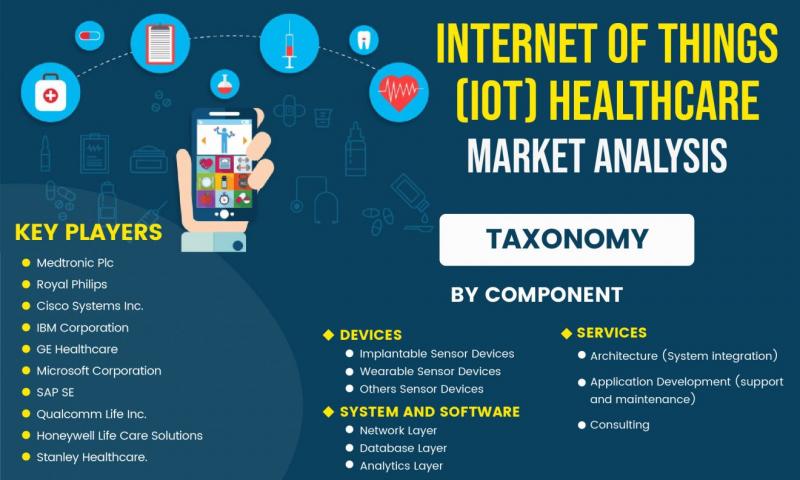The Internet of Things (IoT) has significantly transformed various industries, and one area where its impact has been particularly profound is healthcare. The IoT healthcare market refers to the use of connected devices and sensors to gather and exchange health-related data, enabling more efficient and personalized healthcare services. This market has been rapidly growing due to its potential to improve patient outcomes, reduce healthcare costs, and enhance the overall healthcare experience.
Key components of the IoT healthcare market include:
Connected Medical Devices: These include wearable fitness trackers, smartwatches, blood pressure monitors, glucose meters, and more. These devices continuously collect and transmit data, allowing individuals to monitor their health in real-time.
Remote Patient Monitoring: IoT enables healthcare providers to remotely monitor patients with chronic conditions, reducing hospital readmissions and enhancing patient care. For instance, a heart patient's vital signs can be monitored in real-time, and any anomalies can trigger alerts to medical professionals.
Smart Hospitals: Hospitals are adopting IoT technologies to improve operational efficiency and patient care. IoT-connected equipment, such as smart beds and medication dispensers, helps healthcare providers streamline processes and reduce errors.
Healthcare Wearables: Wearable devices can track various health parameters, including heart rate, sleep patterns, and physical activity. They are also used for early disease detection and intervention.
Data Analytics: IoT-generated data is vast and complex. Data analytics and artificial intelligence (AI) play a crucial role in making sense of this data, identifying trends, predicting outbreaks, and optimizing treatment plans.
Telemedicine: IoT facilitates telemedicine by enabling remote consultations and monitoring. Patients can have virtual appointments with their healthcare providers, reducing the need for physical visits and increasing access to healthcare services.
Security and Privacy: With the sensitive nature of health data, security and privacy are paramount. IoT healthcare solutions must adhere to strict data protection regulations to safeguard patient information.
IoT Platforms: IoT platforms serve as the backbone for connecting and managing devices, data, and applications. They ensure seamless communication and integration within the healthcare ecosystem.
IoT in Pharmaceuticals: IoT is also used in pharmaceuticals for supply chain management, ensuring the quality and safety of drugs from production to distribution.
The IoT healthcare market has numerous benefits, including:
Improved Patient Care: Real-time monitoring and data analysis allow for early disease detection and personalized treatment plans, enhancing patient outcomes.
Cost Reduction: Remote patient monitoring and telemedicine can reduce hospitalization rates and healthcare costs.
Efficiency: IoT technologies streamline healthcare operations, reduce errors, and optimize resource allocation.
Accessibility: IoT expands healthcare access, particularly for remote or underserved areas.
Research and Development: The vast amount of data collected through IoT can support medical research and drug development.
Despite the potential benefits, there are challenges, such as data security and interoperability, that need to be addressed to fully realize the potential of IoT in healthcare market. Nonetheless, the IoT healthcare market is poised for continued growth as technology advances and healthcare providers increasingly embrace these innovations to improve patient care and outcomes.
Read More….
Batten Disease Treatment Market
Vertebral Compression Fracture Devices Market
